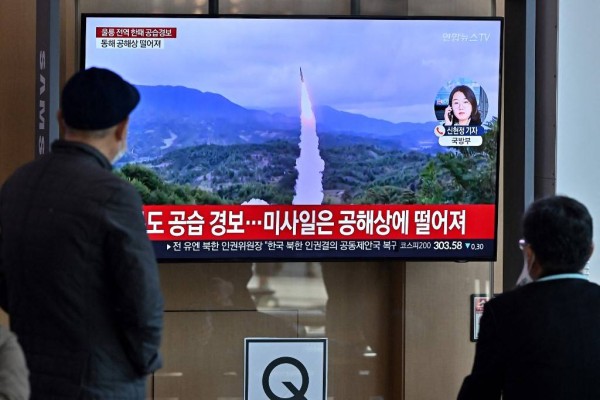[11.2] 北, 미사일 10발 이상 발사, 1발은 남한 부근에 떨어졌다
컨텐츠 정보
- 17,005 조회
본문
한국, 서울 — 북한이 수요일에 10발 이상의 미사일을 발사했다. 그 중 하나는 남한 영해 근처에 떨어졌다. 이 미사일은 윤석열 대통령이 “효과적인 영토 침범”이라고 말했다.
단거리 탄도 미사일 1발이 사실상 양국의 해상 국경인 북방한계선을 넘어 울릉도 주민들에게 벙커로 대피하라는 드문 경고를 촉발했다.
군은 1953년 6·25전쟁이 끝난 뒤 북한의 미사일이 남한 영해 가까이에 떨어진 것은 “분단 이후 처음”이라고 말했다.
청와대는 이날 성명을 통해 “윤 대통령은 북한의 도발은 분단 이후 처음으로 북방한계선을 넘어선 미사일의 실효적인 영유권 침해라고 지적했다”고 밝혔다.
한국과 가장 가까운 미사일은 한국 본토에서 동쪽으로 불과 57km 떨어진 해상에 떨어졌다고 군이 밝혔다.
군은 한국 영해에서 발사된 미사일이 “매우 드물고 참을 수 없다”고 설명하는 성명을 발표했다.
이어 "(도발) 우리 군은 단호하게 대응할 것"이라고 덧붙였다.
얼마 지나지 않아 우리 군은 북한의 미사일이 착륙한 해상 접경 지점 인근에서 공대지 미사일 3발을 발사했다고 밝혔습니다.
북한의 미사일 발사 이후 울릉도에 공습경보가 내려졌다. 이 경보는 국영 텔레비전에 방송되었고 주민들에게 “가장 가까운 지하 대피소로 대피하라”고 지시했습니다.
합동참모본부는 당초 단거리 탄도미사일 3발 발사를 감지했다고 밝혔습니다.
그러나 이후 북한은 “오늘 동서로 다양한 유형의” 미사일 10발 이상을 발사했다고 발표했다.
윤석열 대변인은 이번 발사와 관련해 국가안전보장회의(NSC)를 소집해 "북한의 도발이 대가를 치르도록 신속하고 단호한 조치를 취하라"고 지시했다.
일본도 북한의 미사일 발사를 확인했고, 총리 '기시다 후미오'는 기자들에게 "가능한 한 빨리 국가안보회의를 소집할 것"이라고 말했다.
경계하는 폭풍
평양의 가장 최근 시험 발사는 서울과 워싱턴이 양측에서 수백 대의 전투기가 참여하는 "경계 폭풍"이라고 불리는 사상 최대 규모의 합동 공중 훈련을 실시하면서 이루어졌습니다.
북한의 고위 관리인 "박정천"은 수요일 관영 매체의 보도에 따르면 훈련이 공격적이고 도발적이라고 말했다.
박씨는 이번 훈련의 이름이 1990~1991년 쿠웨이트 침공 이후 이라크에 대한 미국 주도의 군사 공격인 사막의 폭풍 작전(Operation Desert Storm)을 연상시킨다고 말했다.
그는 “미국과 남한이 아무런 두려움 없이 (조선민주주의인민공화국)에 대하여 무력을 사용하려 한다면 우리 군의 특별한 수단은 지체 없이 그들의 전략임무를 수행할 것”이라고 말했다.
“미국과 한국은 끔찍한 사건에 직면하고 역사상 가장 끔찍한 대가를 치르게 될 것입니다.”
한국과 가깝다
정성창 세종연구소 연구원은 AFP에 "북한의 미사일 발사는 2010년 이후 가장 공격적이고 위협적인 대남 무력시위"라고 말했다.
그는 “지금은 무력 충돌로 이어질 수 있는 위험하고 불안정한 상황”이라고 덧붙였다.
2010년 3월 북한 잠수함이 우리 군함 천안함을 어뢰로 피격하여 의무 복무 중인 16명을 포함하여 46명의 선원이 사망했습니다.
같은 해 11월, 북한은 남한의 접경 섬에 포격을 가해 해병 2명을 죽였습니다. 둘 다 젊은 징집병이었습니다.
수요일의 미사일 시험은 북한이 전술적 핵 훈련이라고 말한 것을 포함하여 최근의 대대적인 발사에 따른 것입니다.
미국과 한국은 이번 발사가 북한의 7번째 핵실험으로 절정에 달할 수 있다고 거듭 경고해왔다.
박원곤 이화대 교수는 AFP통신에 “내가 기억하는 한 북한은 한미 연합훈련 때 그런 도발을 한 적이 없다”고 말했다.
“평양이 가장 강력한 억제력을 완성한 것 같습니다. 이것은 심각한 위협입니다. 북한도 핵능력에 자신이 있는 것 같다”고 말했다.
This is the Original Article from MANILA BULLETIN
[11.2] N. Korea fires more than 10 missiles, and one landed close to S. Korea
SEOUL, South Korea — North Korea fired more than 10 missiles on Wednesday, including one that landed close to South Korea’s waters that President "Yoon Suk-yeol,"said was “effectively a territorial invasion”.
One short-range ballistic missile crossed the Northern Limit Line, the de facto maritime border between the two countries, prompting a rare warning for residents on the island of Ulleungdo to seek shelter in bunkers.
The military said it was the “first time since the peninsula was divided” at the end of the Korean War hostilities in 1953 that a North Korean missile had landed so close to the South’s territorial waters.
“President "Yoon" pointed out today that North Korea’s provocation is an effective territorial invasion by a missile that crossed the Northern Limit Line for the first time since the division,” his office said in a statement.
The missile that was closest to South Korea landed in waters just 57 kilometers (35 miles) east of the South Korean mainland, the military said.
The military released a statement describing the missile launch near South Korean territorial waters as “very rare and intolerable”.
“Our military vowed to respond firmly to this (provocation),” it added.
Soon after, the South Korean military said it had fired three air-to-ground missiles near the spot on the maritime border where the North Korean one had landed.
An air raid warning was issued for Ulleungdo after the North Korean missile launch. The alert was flashed on national television and told residents to “evacuate to the nearest underground shelter”.
The South Korean military’s Joint Chiefs of Staff initially said it detected the launch of three short range ballistic missiles.
But it later announced North Korea had fired more than 10 missiles “of various types today towards the east and west”.
"Yoon Suk-yeol" called a meeting of the National Security Council over the launches, ordering “swift and stern measures so that North Korea’s provocations pay a clear price.”
Japan also confirmed North Korean missile launches, with Prime Minister "Fumio Kishida" telling reporters he planned to call a “national security meeting as soon as possible.”
Vigilant Storm
Pyongyang’s latest test firing came as Seoul and Washington staged their largest-ever joint air drills, dubbed “Vigilant Storm” and which involve hundreds of warplanes from both sides.
"Pak Jong Chon", a high-ranking official in North Korea, said the drills were aggressive and provocative, according to a report in state media on Wednesday.
"Pak," said the name of the exercises harks back to Operation Desert Storm, the US-led military assault on Iraq in 1990-1991 after it invaded Kuwait.
“If the US and South Korea attempt to use armed forces against the (Democratic People’s Republic of Korea) without any fear, the special means of the DPRK’s armed forces will carry out their strategic mission without delay,” he said.
“The US and South Korea will have to face a terrible case and pay the most horrible price in history.”
Close to S. Korea
North Korea’s missile launches on Wednesday were appeared to be “the most aggressive and threatening armed demonstration against the South since 2010,” "Cheong Seong-chang," a researcher at the Sejong Institute, told AFP.
“It is now a dangerous and unstable situation that could lead to armed conflicts,” he added.
In March 2010, a North Korean submarine torpedoed the South Korean naval vessel Cheonan, killing 46 sailors including 16 who were on their mandatory military service.
In November the same year, the North shelled a South Korean border island, killing two marines — both of them young conscripts.
Wednesday’s missile tests follow a recent blitz of launches, including what the North said were tactical nuke drills.
Washington and Seoul have repeatedly warned the launches could culminate in another nuclear test — which would be Pyongyang’s seventh.
“As far as I can remember, North Korea has never made such a provocation when South Korea and the US were holding their joint drills,” "Park Won-gon," a professor at Ewha University, told AFP.
“Pyongyang seems to have completed its most powerful deterrent. This is a serious threat. The North also seems confident in their nuclear capabilities.”
관련자료
-
이전
-
다음


